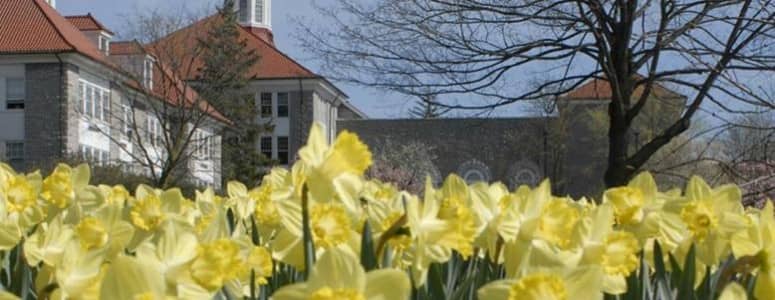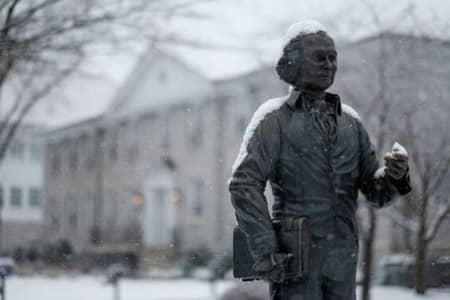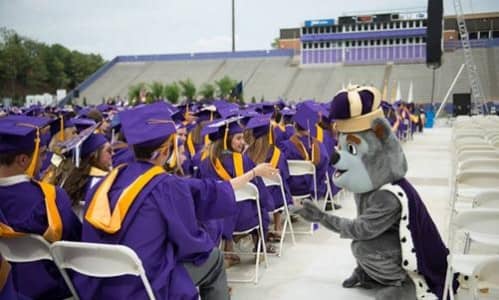James Madison University
Harrisonburg, Virginia
James Madison University invites students to come forth, learn great things, and brighten the future. With plenty of global study and civic engagement opportunities, students have plenty of room to grow and succeed.
Get to know James Madison University
College Highlights
THE HUMAN COMMUNITY
Every student, no matter their major or professional program, is required to participate in the Human Community. James Madison’s Human Community examines the foundations of a college education and seeks to prepare students for academic and personal success. The program is broken into five separate clusters, each with its own focus. Students take courses within these clusters and build a repertoire of marketable skills.
The Clusters
Cluster One examines three different areas: Critical Thinking, Human Communication, and Writing.
Cluster Two explores the Arts and Humanities.
Cluster Three focuses on scientific and mathematical investigation.
Cluster Four is a study of social and cultural processes.
Cluster Five explores Individuals in the Human Community.
STUDENT CONFERENCE
Nominated students have the opportunity to participate in the Student Conference, a celebration of undergraduate achievement. Professors select students that have demonstrated academic excellence in some presentation or body of work. The student then has the chance to demonstrate their talent at the conference. This is a great opportunity for students to practice their public communication skills.
INFORMATION LITERACY REQUIREMENT
James Madison recognizes the importance of effective communication and information literacy. All students are required to take and pass the MREST information literacy test within their first year at JMU. James Madison insists that all students pass before their sophomore year because information literacy skills are necessary for navigating the undergraduate experience.
COMMUNITY-BASED LEARNING
James Madison regards service as an integral part of higher education. The department of Community Service-Learning partners with 75 organizations within the Shenandoah Valley community. The purpose of community based learning is to increase student awareness of the society around them. James Madison wants all its graduates to be well-rounded leaders with experience in civic engagement and service to those in need.
HONORS PROGRAM
The Honors Program selects exceptional students to become members of an accelerated, academic community. Honors students enjoy several benefits like study abroad opportunities, financial support, and priority registration. Every student enrolled in the Honors Program is required to complete the Senior Honors Project. For track I and II Honors students, the final project is a capstone experience that allows students to demonstrate their intellectual abilities and talents.
ENROLLMENT BY ETHNICITY
Non-U.S. Citizen: 1%
Hispanic/Latinx: 7%
Black or African American, non-Hispanic: 5%
White, non-Hispanic: 75%
Native/Indigenous American or Alaska Native, non-Hispanic: 0%
Asian, non-Hispanic: 5%
Native Hawaiian or other Pacific Islander, non-Hispanic: 0%
Two or more races, non-Hispanic: 5%
Race and/or ethnicity unknown: 2%
ALTERNATIVE SPRING BREAK
James Madison offers both international and domestic alternative spring break trips. Each service group contains approximately 12 students, 2 student co-leaders, and a faculty coordinator. Students typically volunteer for service trips during spring break, but options are available over all academic breaks. JMU observes the eight Break Awaysteps and a ninth college-specific step when embarking on service trips.
The Break Away steps:
Step 1: Strong Direct Service
This element focuses on hands-on service within the community in need. Volunteers should realize their position and privilege and seek to enact positive change.
Step 2: Orientation
Before departure, students should become familiar with the values and mission of the organization they will be working with. Students should internalize the goals of the organization and work to embody those ideals.
Step 3: Education
Students should be educated on the political, cultural, and historical aspects of the society in which they will be working. By studying the elements of a society prior to arrival, students gain a more accurate picture of the task ahead of them.
Step 4: Training
Students will be properly prepared to serve through training. JMU recognizes that students may need to learn how to serve prior to leaving. Training is provided to ensure that each student is ready to make a difference.
Step 5: Reflection
Reflection is an important part of service. Students are pushed to make connections between their studies and their service efforts.
Step 6: Reorientation
Reorientation occurs when students arrive back on campus. Volunteers come together and reflect upon their experiences. In many cases, students continue their service journey by working within the local community.
Step 7: Diversity and Social Justice
There are a lot of elements to consider before embarking on a service trip. Perhaps most important is the evaluation of social justice and diversity. Students need to be made aware of the social, racial, religious, and economic inequalities they could encounter. With this knowledge, students can more accurately serve the community in need.
Step 8: Alcohol and Drug Free
Alternative breaks are drug and alcohol free, and this rule is strictly enforced.
Step 9: Conscientious Living
All students have a strict budget for meals. They must also agree to leave their cell phones and laptops behind, as well as adopt an eco-friendly lifestyle. These rules are enforced to show students how underprivileged societies live.
RESIDENTIAL LEARNING COMMUNITIES
Residential Learning Communities (RLCs) allow students the unique opportunity to live and take classes with a small group of peers that share similar interests. There are several benefits to participation, including better interaction with faculty, academic support, and a community of peers that share common goals. James Madison offers several different community options. Below are the current residential learning communities:
Arts: Students interested in visual and performing arts are invited to join this community. Arts takes a critical approach to several different forms of art, including music, theatre, and exhibitions.
The Honors Living and Learning Center: Selected students are invited to join the Honors Community. This residence focuses on academic excellence and personal development in both the roles of a leader and an active citizen.
Huber (Not accepting applications for 2015-2016): The Huber learning community is for pre-professional health students. Participants are introduced to the world of health though faculty interaction, networking events, and course-related events.
Madison Engineering (MadE): MadE is a learning community open to engineering students. MadE is an academic environment in which engineering students can explore their interests within their chosen field. Students also enjoy the benefit of student and faculty collaborations.
Madison International: Madison International is a community of global citizens. Members of this community are both international and domestic students. Madison International explores local and global issues, while teaching students to act as active and engaged citizens of society.
Psychology: The Psychology Learning Community is open to all psych. majors and students interested in psychology. The program is open to 20 students and serves as an introduction to the world of psychology. Students take courses that later serve as pre-requisites if they decide to pursue the major.
Roop: Roop is for students interested in pursuing a career in teaching (Pre-K through 12). Participants live together in Gifford Hall and have the option to work in local schools.
SEEDs of Science: Students interested in teaching secondary science education are encouraged to join SEEDs of Science. Students in this community have to pursue a major in Biology, Chemistry, Earth Science, Geology, or Physics. They also have to fulfill a minor in secondary education.
Trelawney: Trelawney is open to first year biology students with an interest in research. Every member of this community has the chance to work with faculty or graduate students that are conducting research.
INTERNSHIPS
JMU students are highly encouraged to seek out internship opportunities. Not only do internships allow participants to gain industry experience, but they help establish professional networks between students and employers. Internships are different than externships, which are much shorter in duration and unpaid. An externship is perfect for students looking to get a glimpse at an industry without a long-term commitment.
Internship 101: Internship 101 is a workshop for JMU students preparing to seek out internship and externship opportunities. Students learn about the process of selecting the right position.
Admission
TEST SCORES
Optional
FRESHMAN PROFILE
SAT Evidence-Based Reading and Writing
25th Percentile: 570 | 75th Percentile: 650
SAT Math
25th Percentile: 550 | 75th Percentile: 630
ACT Composite
25th Percentile: 23 | 75th Percentile: 28
Tuition & Cost
Tuition (in-state): $7,250
Tuition (out-of-state): $23,564
Fees: $5,080
Room: $5,508
Board: $5,840
Contact James Madison University
Contact Admissions
www.jmu.edu/admissions
(540) 568-5681
admissions@jmu.edu
Campus Location
800 South Main Street
Harrisonburg, VA 22807
(540) 568-6211
Visit James Madison Online



